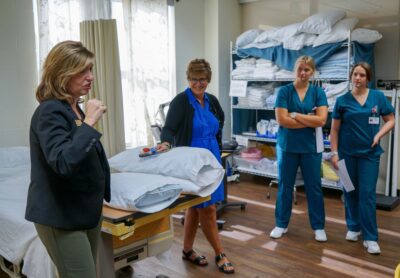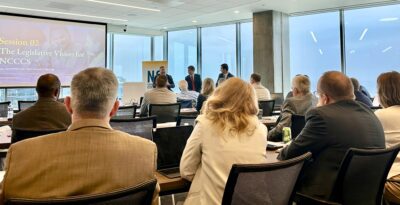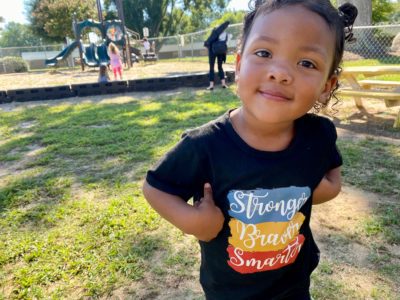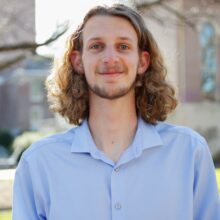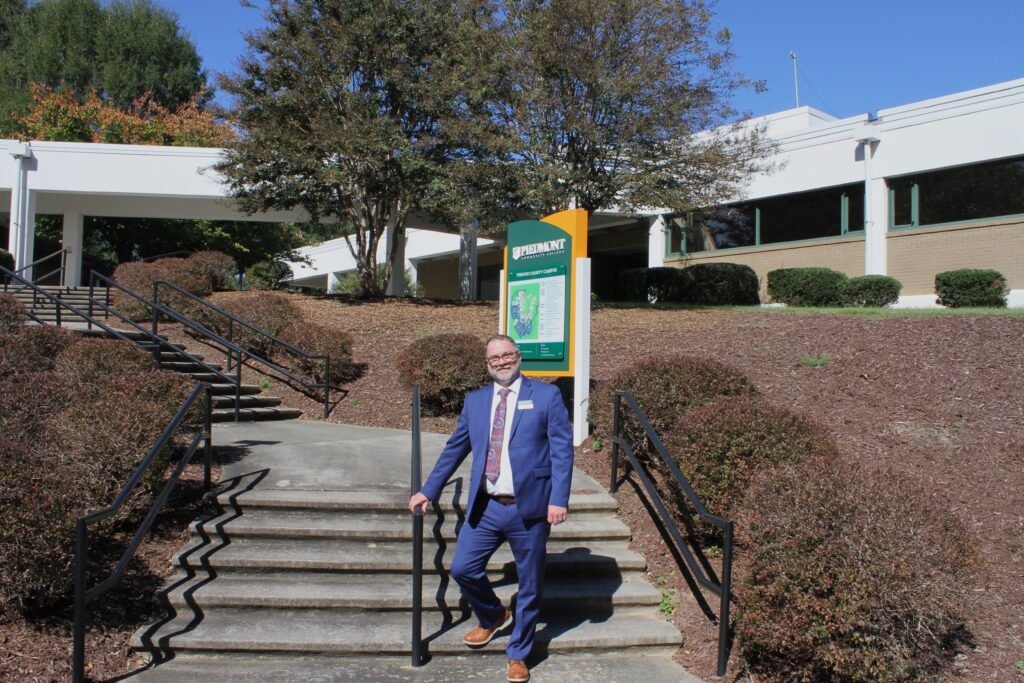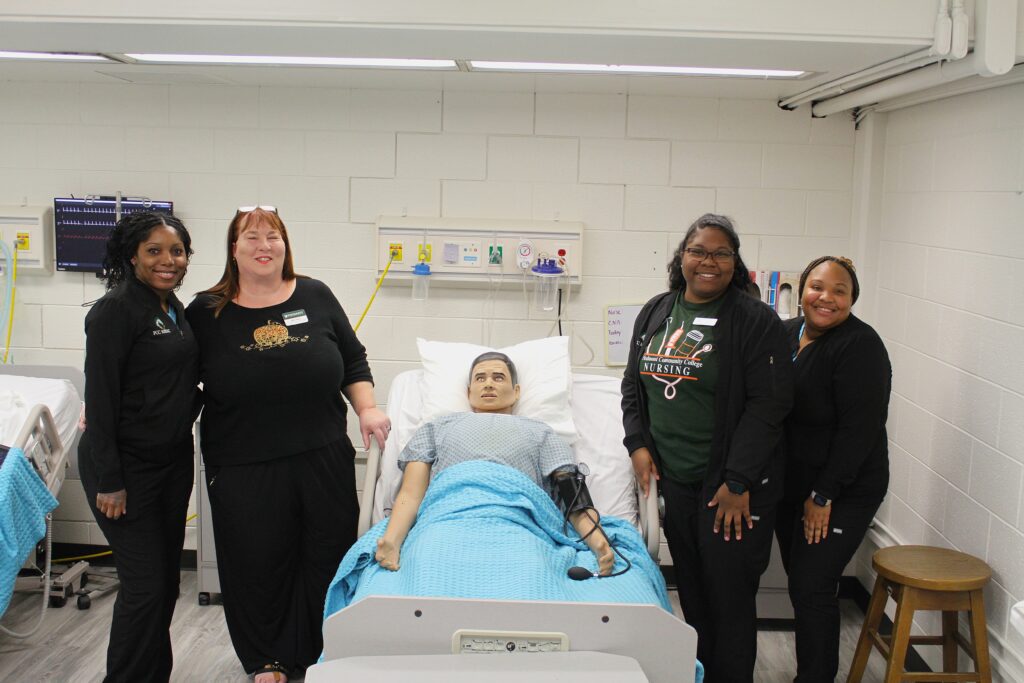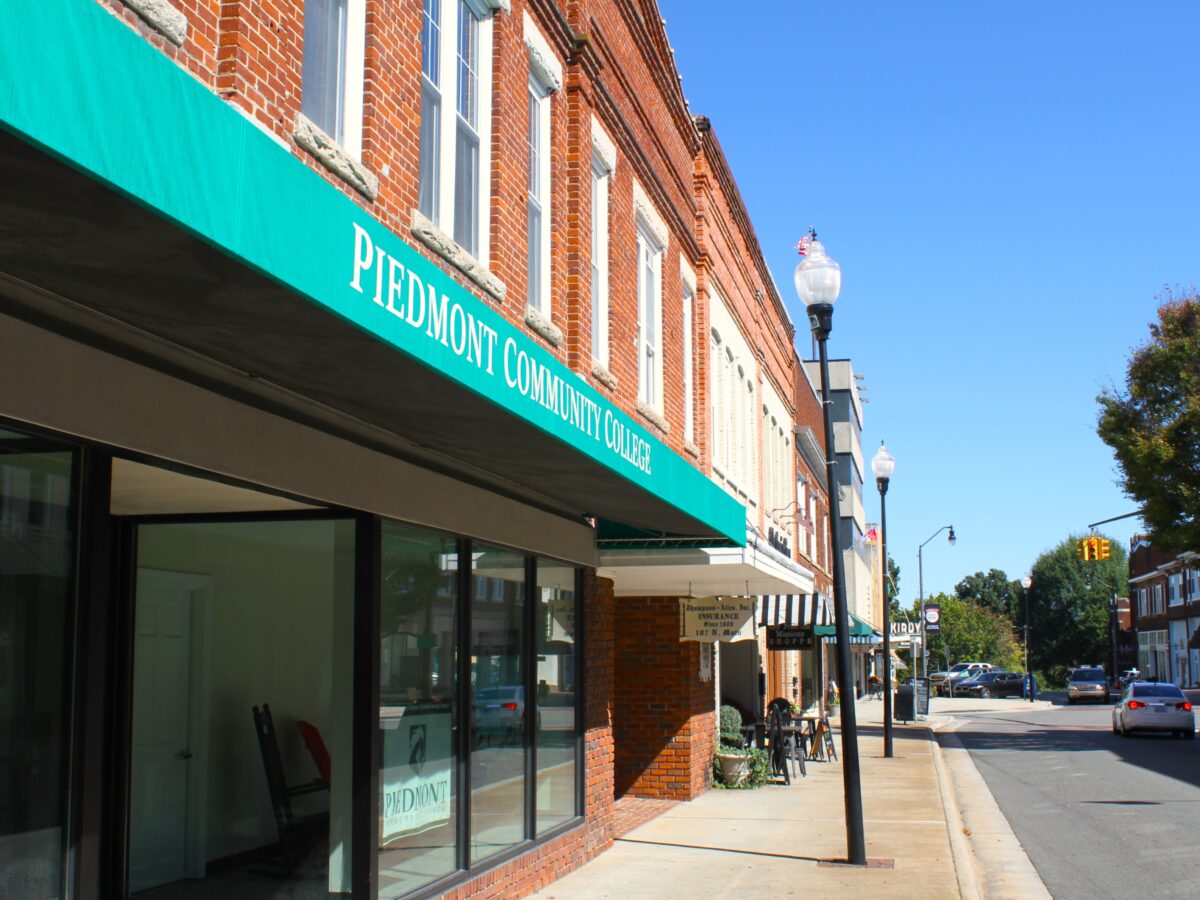
This article is part of EdNC’s fall 2025 “mini-blitz” to visit community colleges with presidents who began their tenure in the last two years. You can read all of our coverage of community colleges here and all of our coverage of community college presidents here.
Dr. Kevin Lee, the new president of Piedmont Community College (PCC), carries a leather notebook with an image of the Cape Hatteras lighthouse on the front. An eastern North Carolina native and graduate of the N.C. Community College System, he holds his history with him.
Lee joined PCC in August 2025 amid expansion. Enrollment is up. New programs are kicking off. The college recently acquired a 90,000-square-foot building, formerly used to manufacture car wash equipment, which will become its south campus.
The college’s reach spans two rural counties with a main campus in Roxboro. According to PCC administration, the community needs more qualified workers, from nurses to information technology (IT) specialists to plumbers.
Lee said PCC will meet that need.
“It’s the backbone of the community. Piedmont Community College represents so much for our communities here in Caswell and Person County,” Lee said. “We’re in every conversation.”
Lee moved from the coast to the Piedmont region to take the job at PCC, but he doesn’t look one bit out of his element. EdNC visited PCC in October and spoke with him about what led him to the role and his vision for the college.
![]() Sign up for Awake58, our newsletter on all things community college.
Sign up for Awake58, our newsletter on all things community college.
A vision informed by experience
Lee grew up in Swansboro where the family business was working with one’s hands. As a child, he topped, suckered, and harvested tobacco plants, and wrangled shrimp nets.
He played baseball (pitcher, shortstop) and football (wide receiver, free safety) through high school, but not well enough to play in college. He joined the Air Force never having flown in a plane.
— Dr. Kevin Lee
The power of education is ridiculous, and the community college is the first step in opening doors.
When Lee returned home from military service, he got a job driving a forklift for a company that made shower heads and faucets. His friends were finishing college, starting careers, and starting families; he wanted something more.
He worked up the nerve to enroll at Coastal Carolina Community College. He remembers sitting in his car and summoning the courage to enter the career adviser’s office.
“I just felt like I was a little bit out of place,” Lee said. “College was something for the ‘haves.’”
That moment — deciding to enroll — was the beginning of a chain of events that led to Lee becoming the president of PCC decades later. His resume would grow, but of all its bullet points, he seems proudest to be a graduate of the community college system.
He studied computers — “never had a computer in my life” — and continued his education at High Point University before working at Oracle. A supervisor requested that he join an advisory committee for Guilford Tech Community College (GTCC), which led to him teaching his first programming night class at the college.
“I fell in love with it the first time I saw that light bulb moment come on,” Lee said. “The students that came in, I could see myself in them.”
He taught more nights. He taught Saturday mornings. He became a full-time instructor at GTCC, then the department chair. Under Lee, the department grew threefold in 10 years to more than 900 students.
When he moved to Brunswick Community College (BCC) to lead the STEM and trades programs, it was out of a desire to have a greater impact, which Lee describes using the metaphor of “fingerprints.”
“I saw the fingerprints I had on my students in class. Then I saw my fingerprints in the curriculum, the design of it, programs and offerings that we had, partnerships we made with local IT companies. I really wanted to put my fingerprints on a little bit more,” he said.
At BCC, Lee became even more sure of his calling. He was drawn to the operational side of the college because the broader his reach, “the more students I can help.”
“I saw the ability now to put my fingerprints on entire programs across the entire campus, and lead all the faculty,” he said. “Because I came up from that faculty role, I saw such an opportunity to lead with passion, lead with pride, lead with a sense of empathy for students, just the proper way for what community college is supposed to be.”
The logical next step
Dr. Gene Smith, president of BCC and a mentor to Lee, told Lee he thought he could be the president of a college. Lee replied that would be like climbing Mount Everest.
Yet, as vice president, Lee got involved with state groups and committees; he wrote grants; he traveled to D.C. to fight for Pell Grant expansion. He was primed to lead a college.
He browsed vacancies across the state, but didn’t see any that would be a good fit for him and his family. Lee is married and has three grown sons. His wife, Jennifer Lee, is a department head at Wake Technical Community College.
But later, when the PCC president position opened, he and Jennifer drove up to Roxboro to get to know the area. He made the decision to apply that day.
“This is the first place I ever applied for a presidency, and I was very intentional about it,” Lee said. “I never looked in the rearview mirror.”
A ‘servant leader’
Lee is a caring and devoted leader. He does his research, supports his team, and looks on proudly when he listens to students speak.
He also brings the unique perspective of having been a North Carolina community college student to his new role. Not so long ago, he was nervous in his car, weighing whether to sign up for classes of his own.
“I’ve sat in your seat and taken CIS-115, CIS-110, HUM-110. I’ve taken the same classes that you’re taking. Being able to say that I’ve walked the walk that a student has, I think that’s very unique,” he said.
On the path from there to here, Lee has grown and facilitated growth. Growth, he said, is what’s in store for PCC moving forward.
“Right now, I’m just being a sponge and absorbing everything,” he said. “But I’m so excited because the school is primed for (transformation). We’ve got such great people here. We’ve got great students. We have such great bones at this college.”
PCC has recently experienced record enrollment growth, and Lee said the college is due to grow more next year. New programs include nursing, medical assisting, and practical nursing in 2024; and Commercial Driver License (CDL) and sonography in 2025.
Lee aims to facilitate the growth PCC has been experiencing, describing his leadership style as “servant leader.” He said the mission of every community college is to serve students.
“If we’re not here for that, then why are we here?” he said.
Forces in the region
Across the state, community colleges are focused on meeting workforce needs. PCC is no different. As things are, the college is literally hitting walls trying to meet those needs.
“We’re busting at the seams here with this campus,” Lee said. For example, the practical nursing program received 87 applications for 48 spots this year. “So we’re cramming. We’re backfilling,” he said.
The 90,000-square-foot south campus building will host many of the programs currently operating on the main campus, freeing up space for others to expand.
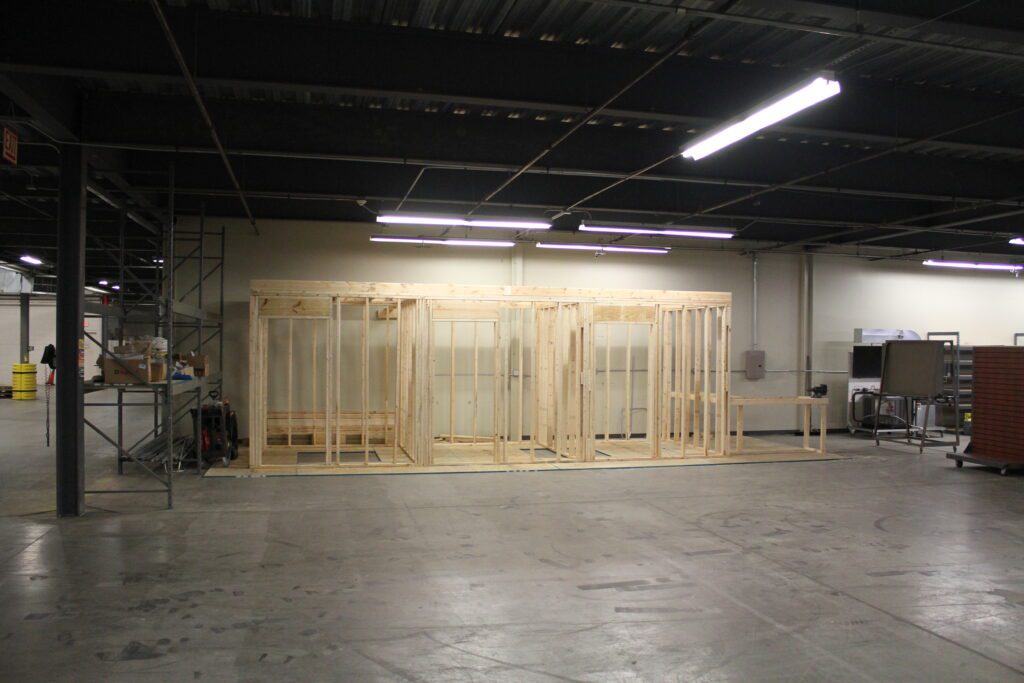
Touring around the cavernous new building, named the Center for Health, Advanced Technology and Trades, which will host the college’s HVAC, plumbing, electrical, CDL, and welding programs, Lee spoke about the prospect of a surge in IT workforce demand.
Last year, Microsoft bought a huge swath of land in Person County, which is rumored to be the future site of a new data center.
“It’s a big opportunity. The community is kind of pumped about it,” Lee said. As someone with an IT background, he said, he is prepared to “speak the same language” and interface with Microsoft if they build.
Aside from the Microsoft site, PCC’s surrounding community is already seeing increased demand for skilled workers, college employees said. Jody Blackwell, dean of technical and manufacturing programs at PCC, mentioned plumbing and HVAC workers as being particularly in demand in Person and Caswell counties.

Blackwell has moved his office into the new building and is overseeing the expansion of the programs newly housed there. He said that as Durham’s suburbs expand up U.S. Route 501 and more people pay taxes to Person County (which is part of the Durham-Chapel Hill metropolitan statistical area), the college will have more resources to address growth needs.
Blackwell also said PCC has existing relationships with companies in the region, other institutions such as Durham Technical Community College, and even partners across the border in Virginia. That’s important for connecting students to work and fulfilling community needs, Lee said.
“Success for us, that’s enrollment, making sure we get a good influx of students. Then the second measurement of that is, are we putting people to work?” Lee said. “Are we bringing them in and are we getting them jobs?”
What success will look like
Lee likened watching students graduate from their programs to the light bulb moments from the first night class he ever taught. To him, the more of those moments, the better.
That means expanding PCC to meet the demands of students and local businesses; that means building out a new Center for Educational and Agricultural Development in Caswell County; that means leveraging new grant money for artificial intelligence (AI); and it means a thousand more things.
When asked about his personal metrics, Lee said he measures success every single May, when he’s at the podium and shaking the hands of graduating students.
“The goal is attainment, that is the mission. That’s what we’re doing. That’s how I measure success,” he said. “It’s not a very hard sell, of why somebody would want to do the job that I do.”
Recommended reading
